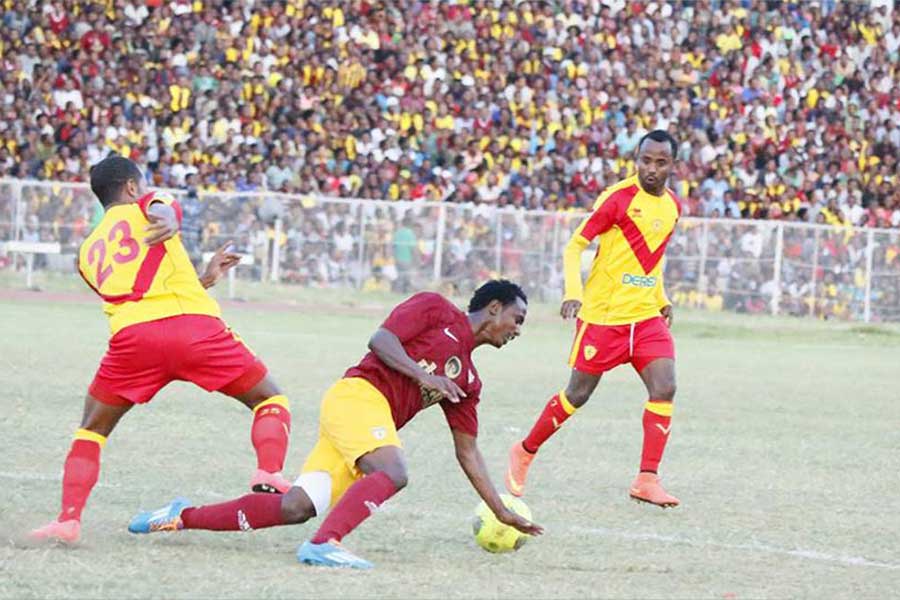
Radar | Sep 10,2021
Dec 28 , 2019.
A one-of-a-kind, if not curious, seminar was held at the Hyatt Regency Hotel late last week. Organised by the Institute for Strategic Affairs (ISA), a federal agency run by Hallelujah Lulie, its focus was on the security sector's conduct during times of transition. Enlisting panelists such as Gebretsadkan Gebretensae, a retired army general who once served as chief-of-staff of the Ethiopian army, the seminar tried to examine the "effectiveness, efficiency, legitimacy and accountability" of the security community, which comprises no less than eight institutions.
The Ethiopian army is one of these and is undergoing a reform process comprising six programmes, which its strategists hope will achieve 11 goals. In the eyes of the architects of the defence reforms, the objectives are to strengthen civilian oversight, enhance social control, make it transparent and accountable, as well as modernise it to become professional, modern and competent enough to respond to predictable and unpredictable threats.
Here is where tough questions should be raised: What are these threats? Who defines the nature of them? Whoever is tasked to do the definition, where do they get the mandate from? Where does the army's capability to use its resources stop? What is the mandate of the military in society?
These may be issues that are hard to build consensus around. But with the ongoing reform effort, they have begun anew with different people within the army and the political establishment holding various and, understandably, conflicting views.
Granted, Ethiopia's Constitution incorporates no less than five provisions concerning the role and mission of the army in the republic. It commands the army to safeguard the country's sovereignty and orders it to discharge its responsibilities under a state of emergency. But it bans the defence institution from any involvement in partisan political organisations.
Nonetheless, what does safeguarding sovereignty involve? What does compliance with the Constitution really mean? Does it require the army to intervene if and when constitutional provisions are violated and trampled by the political class? Or any other group for that matter?
The army and its leaders are at a crossroads, grappling with these vexing issues.
Some believe the primary role of the Defence Forces is to guard the national borders against foreign threats and aggression; and, it stops there. They would not want to see the army meddle in any domestic political squabbling as some of the armies in places like Egypt, Turkey and Pakistan do. For them, it is neither a guardian nor a custodian of a democratic order.
Others have a broadened understanding of the concept of sovereignty. It is also about ensuring human security within a defined state, whether the threat comes from within or outside. The army should not be a bystander in the face of blatant violations of the Constitution and massive atrocities committed against humanity. They would argue that the protection of the Constitution is the primary security issue and the only way to guarantee the viability of a country.
People in this category worry that scrupulous politicians, even if they get to power through legitimate means, can subvert the constitutional order gradually, and the army may be the only independent and powerful institution that can stop them. And they contend that for it to be a bystander in such an extreme situation is foolhardy.
The latter view champions the army as the last guarantor of the constitutional and democratic order. It tends to view the military as having a democracy-safeguarding role during a transition to a stable democratic order.
But it is a view no different from a doctrine the late Prime Minister Meles Zenawi had authored in what is known in the army as "the red-book". It sees the army as the last bastion for Revolutionary Democracy, a partisan political agenda that politicised the military.
The supra-nature of an army in society is not without precedent in the world or history. Armies have intervened to topple authoritarian regimes and played a democracy-promoting role in Turkey and Portugal, for instance. But asking the army to play watchdog over what should be handled by other civic and democratic institutions, in an area that it has neither the expertise nor the training, is a slippery slope that would drag it into partisan politics. It is something that needs to be avoided by all means.
Asking the generals to make a judgment over whether actions by civilian leaders are constitutional is compelling them to make political decisions that parliament and the courts should make. Even if all these fail, citizens still retain the power of civil disobedience. Portraying the intervention of the army as the only option is not within the bounds of wisdom.
For the very few examples of the army’s constructive involvement in promoting or safeguarding democracy, there are abundant instances of history where armies - initially intervening in the guise of restoring law and order - have swiftly moved to establish military dictatorships. Though this is usually done with a promise of a quick return to civilian rule, those promises are often broken, and armies stay in power for a long time. Once invited into the political arena, it is hard to dislodge them from the corridors of power.
Asking the military to involve itself with any political process, even with the good intentions of protecting the Constitution, is demanding from people of uniform something they are not equipped or qualified to do. It detracts from their core mission. It poses the risk of the misuse or abuse of power. It creates a dangerous militarisation of law enforcement.
If armies' intervention into the political order is unavoidable, it only shows that there is a total breakdown of constitutional order. At that point, there is no democracy or Constitution to guard; instead, there is a complete failure of a political system.
The Ethiopian political landscape today is, unfortunately, a highly polarised one. Most institutions have been tainted with political interference and co-optation. There are not many institutions or leaders that garner instant respect as autonomous figures.
The army is an exception. It is one of the few - if not the only institution - that enjoys a certain level of acceptance and respect as a national institution with a mostly non-partisan stance. That in itself is a credit to the army, especially in recent days when its leaders have been pushed continuously to play a law enforcement role in different parts of the country.
In today’s polarised and fragmented political environment, it puts the country at risk of losing one of the few national institutions that have, for the most part, remained above the fray.
Military leaders should avoid the trap of, and temptation for, political ambition in as much as politicians should stay clear of tempting the men and women of uniform to demonstrate political partisanship in their favour. Political leaders should exercise the most restraint to avoid the bent to call the army to interfere in political disputes or interpret disagreements over constitutional matters. Those are best left to the courts and other democratic institutions.
The army should remain professional, at all times obeying and carrying out its function free of any partisanship to any political organisation as the Ethiopian Constitution stipulates under Article 87.
The cornerstone of constitutionalism is limited government; the concept is that all parts of the state structure have an area of focus delineated and the power entrusted to them limited to the task assigned. No part of the state is called to be and do all things for the republic.
Leaving the army alone to fulfill its assigned tasks is the wise and constitutional path to take. Leaders of the Ethiopian Defence Forces would do historical justice in not only safeguarding the constitutional order but also in their determination to not submit to unconstitutional demands that come from the political establishment.
That the army has had such leaders in its history as Gebretsadkan (Lt. Gen) remains a living example of such courage of conviction.
PUBLISHED ON
Dec 28,2019 [ VOL
20 , NO
1026]

Radar | Sep 10,2021

View From Arada | Jul 20,2019

Radar | Nov 09,2024

Radar | Nov 16,2019

Radar | Oct 24,2020

Fortune News | Mar 28,2020

Advertorials | Jul 17,2023

Radar | Mar 16,2024

View From Arada | Mar 13,2021

Radar | Jun 12,2023

Photo Gallery | 174925 Views | May 06,2019

Photo Gallery | 165151 Views | Apr 26,2019

Photo Gallery | 155416 Views | Oct 06,2021

My Opinion | 136746 Views | Aug 14,2021

Dec 22 , 2024 . By TIZITA SHEWAFERAW
Charged with transforming colossal state-owned enterprises into modern and competitiv...

Aug 18 , 2024 . By AKSAH ITALO
Although predictable Yonas Zerihun's job in the ride-hailing service is not immune to...

Jul 28 , 2024 . By TIZITA SHEWAFERAW
Unhabitual, perhaps too many, Samuel Gebreyohannes, 38, used to occasionally enjoy a couple of beers at breakfast. However, he recently swit...

Jul 13 , 2024 . By AKSAH ITALO
Investors who rely on tractors, trucks, and field vehicles for commuting, transporting commodities, and f...

Oct 18 , 2025 . By NAHOM AYELE
In a sweeping reform that upends nearly a decade of uniform health insurance contribu...

Oct 18 , 2025 . By BEZAWIT HULUAGER
A bill that could transform the nutritional state sits in a limbo, even as the countr...

Oct 18 , 2025 . By SURAFEL MULUGETA
A long-planned directive to curb carbon emissions from fossil-fuel-powered vehicles h...

Oct 18 , 2025 . By BEZAWIT HULUAGER
Transaction advisors working with companies that hold over a quarter of a billion Bir...